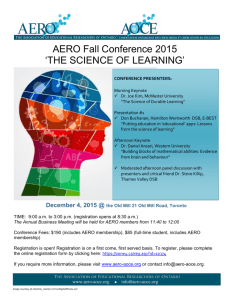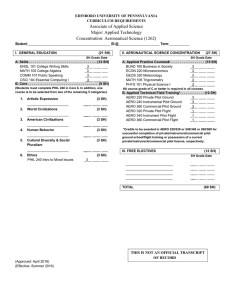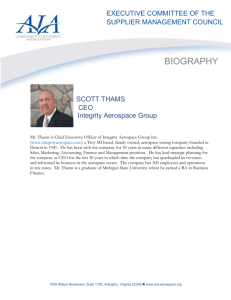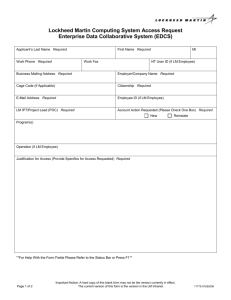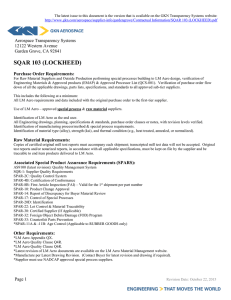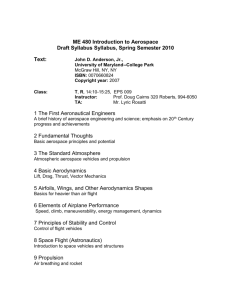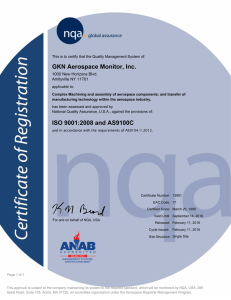Department of Aerospace Wayne Dornan, Chair Business and Aerospace Building 211C
advertisement
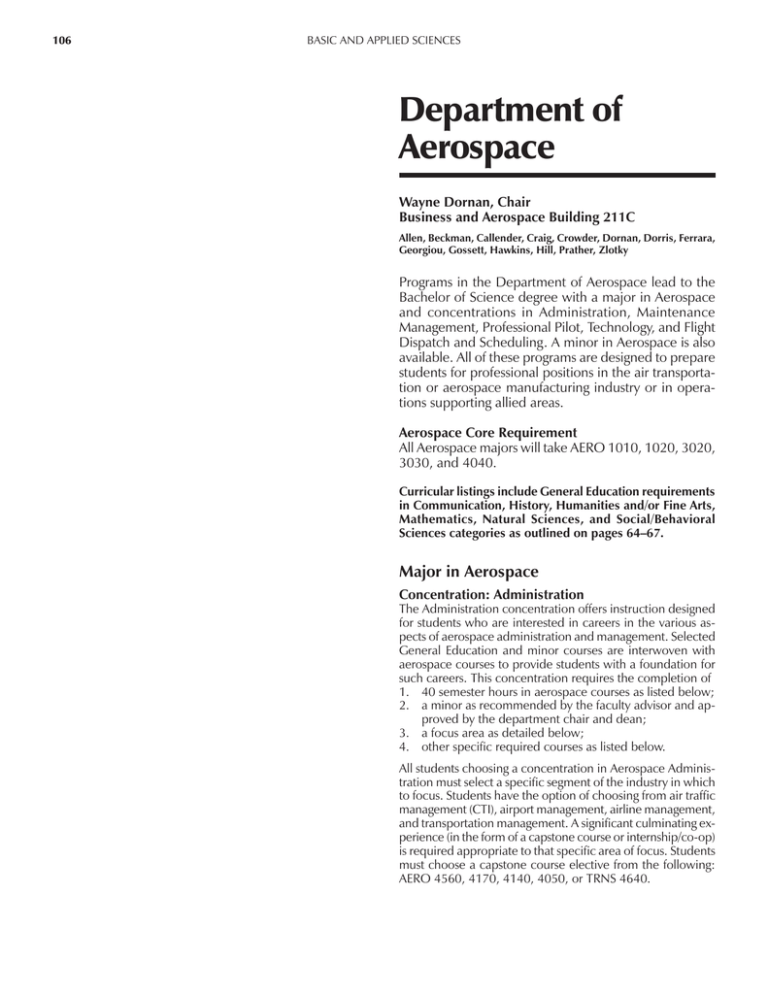
106 Aerospace BASIC AND APPLIED SCIENCES Department of Aerospace Wayne Dornan, Chair Business and Aerospace Building 211C Allen, Beckman, Callender, Craig, Crowder, Dornan, Dorris, Ferrara, Georgiou, Gossett, Hawkins, Hill, Prather, Zlotky Programs in the Department of Aerospace lead to the Bachelor of Science degree with a major in Aerospace and concentrations in Administration, Maintenance Management, Professional Pilot, Technology, and Flight Dispatch and Scheduling. A minor in Aerospace is also available. All of these programs are designed to prepare students for professional positions in the air transportation or aerospace manufacturing industry or in operations supporting allied areas. Aerospace Core Requirement All Aerospace majors will take AERO 1010, 1020, 3020, 3030, and 4040. Curricular listings include General Education requirements in Communication, History, Humanities and/or Fine Arts, Mathematics, Natural Sciences, and Social/Behavioral Sciences categories as outlined on pages 64–67. Major in Aerospace Concentration: Administration The Administration concentration offers instruction designed for students who are interested in careers in the various aspects of aerospace administration and management. Selected General Education and minor courses are interwoven with aerospace courses to provide students with a foundation for such careers. This concentration requires the completion of 1. 40 semester hours in aerospace courses as listed below; 2. a minor as recommended by the faculty advisor and approved by the department chair and dean; 3. a focus area as detailed below; 4. other specific required courses as listed below. All students choosing a concentration in Aerospace Administration must select a specific segment of the industry in which to focus. Students have the option of choosing from air traffic management (CTI), airport management, airline management, and transportation management. A significant culminating experience (in the form of a capstone course or internship/co-op) is required appropriate to that specific area of focus. Students must choose a capstone course elective from the following: AERO 4560, 4170, 4140, 4050, or TRNS 4640. BASIC AND APPLIED SCIENCES Recommended Sequence and Curriculum Requirements FRESHMAN SOPHOMORE AERO 1010, 1020 6 AERO 2010 3 ENGL 1010, 1020 (Comm) 6 AERO 2140, 2220, or 2230 3 MATH 1710 (Math) 3 ENGL 2020 or 2030 or HIST 2010, 2020, or 2030 6 HUM 2610 (Hum/FA) 3 COMM 2200 (Comm) 3 Humanities and/or Fine Arts 3 Humanities and/or Fine Arts 3 Social/Behavioral Sciences TRNS 1610 or 2620 3 (2 prefixes) 6 30 INFS 2200 or 3100 3 MATH 1810 3 Choose one: CHEM 1010/1011, 1030/1031, 1110/1111; PHYS 2010/2011, 2110/2111 (Nat Sci) 4 Choose one: ASTR 1030/1031; BIOL 1030/1031, 1110/1111, 2010/2011, 2020/2021; CHEM 1030/1031, 1110/1111; GEOL 1030/1031; 1040/1041, PHYS 2010/2011, 2110/2111; PSCI 1030/1031 NOTE: Part 1 and Part 2 must be different rubrics (Nat Sci) 4 32 JUNIOR SENIOR AERO 3020, 3030 6 AERO 4040, 4100, 4150 7 ACTG 3000 3 AERO 4110 or 4170 3 MGMT 3610 3 TRNS 3630 3 MKT 3820 3 Elective 3 BCEN 3510 or ENGL 3620 3 Capstone elective 3 AERO or TRNS elective 3 Minor 9 Minor 9 28 30 Concentration: Flight Dispatch and Scheduling The Flight Dispatch and Scheduling concentration offers instruction designed to meet the aviation industry’s needs by preparing professional, corporate, and airline flight dispatchers. Selected General Education and minor courses are interwoven with required aerospace courses to provide students with a foundation for careers in this area. This concentration requires the com­pletion of 1. 43 hours of aerospace courses as listed below; 2. a minor of 18 semester hours to be selected from one of the following: Geography/Geology, Computer Science, Information Systems, or other science or business-related field; 3. other specific required courses as listed below, including FAA Flight Dispatcher Knowledge Tests; 4. FAA Flight Dispatch certification prior to graduation. Recommended Sequence and Curriculum Requirements FRESHMAN SOPHOMORE AERO 1010, 1020, 2010, COMM 2200 (Comm) 1230 12 AERO 2220 or 2230 ENGL 1010, 1020 (Comm) 6 HIST 2010, 2020, or 2030 CHEM 1010/1011 (Nat Sci) 4 ENGL 2020 or 2030 or PHYS 2010/2011 (Nat Sci) 4 HUM 2610 (Hum/FA) MATH 1710 (Math) 3 Humanities and/or CSCI 1150 or INFS 2200 Fine Arts (2 prefixes) or 3100 3 Social/Behavioral Sciences 32 MATH 1810 GEOG 2000 or PSY 1410 (Soc/Beh Sci) JUNIOR SENIOR AERO 3020, 3030, 3510 9 AERO 4530, 4040, 4580, AERO 3080, 3170, 3230 9 4590 10 GEOG 3410 or GEOL 4050 3 MGMT 3810 or 3890 or MGMT 3610 3 4490 or 4510 3 Minor 9 Minor 9 33 Elective 3 25 Concentration: Maintenance Management The Maintenance Management concentration offers instruction designed for students who are interested in careers as skilled technicians or managers in aircraft manufacturing, aircraft repair, engine overhaul, or space vehicle maintenance. The fundamental skills needed in aerospace vehicle repair and maintenance are stressed together with management skills for such careers. MTSU is an approved Federal Aviation Administration (FAA) FAR Part 147 maintenance technician school for airframe and powerplant mechanics. This concentration requires the completion of 1. 75 hours of aerospace courses as listed below; 2. other specific required courses as listed below; and 3. FAA Airframe and Powerplant Certification prior to graduation. A minor is not required. Recommended Sequence and Curriculum Requirements FRESHMAN SOPHOMORE AERO 1010, 1020 6 AERO 2342, 2371, 2381 9 AERO 1340, 1380, 2331 9 ENGL 2020 or 2030 or ENGL 1010, 1020 (Comm) 6 HUM 2610 (Hum/FA) 3 MATH 1710 (Math) 3 Humanities and/or Fine Arts 3 MATH 1810 3 HIST 2010, 2020, or 2030 6 COMM 2200 (Comm) 3 CHEM 1010/1011 (Nat Sci) 4 Humanities and/or Fine Arts 3 PHYS 2010/2011 (Nat Sci) 4 Social/Behavioral Sciences 3 ET 1310 2 36 31 JUNIOR SENIOR AERO 3020, 3030 6 AERO 3362, 3371, 4040 7 AERO 3301, 3322, 3392 9 AERO 4310, 4332, 4342 9 AERO 4301, 4311, 4312 9 AERO 4371, 4381, 4392 9 ET 3610 4 MGMT 3810, 4490, 4510, MGMT 3610 or ET 3910 3 or 4920 3 Social/Behavioral Sciences 3 AERO 4340 3 34 31 NOTE: Additional aerospace maintenance courses are required if FAA certification is sought. Students enrolled in the Airframe and Powerplant Technician’s Program are required to pass a comprehensive qualification examination prior to receiving authorization to take the FAA examination or prior to receiving a Certificate of Completion from MTSU. Concentration: Professional Pilot 3 3 6 3 6 3 3 3 30 Aerospace 107 The Professional Pilot concentration offers instruction for students who are interested in careers as commercial pilots. The Professional Pilot concentration requires the completion of 1. 52 semester hours in aerospace courses as listed below; 2. a minor from a department other than Aerospace that complements the Professional Pilot concentration, recommended by the faculty advisor and approved by the department chair and dean; 3. other specific required courses as listed below; 108 Aerospace BASIC AND APPLIED SCIENCES 4. the Instrument Rating-Airplane, the Commercial SingleEngine Pilot Certificate, and the Commercial Multi-Engine Pilot Certificate with Instrument Rating, all at the MTSU Flight School and while enrolled in flight labs. Recommended Sequence and Curriculum Requirements FRESHMAN SOPHOMORE AERO 1010, 1020, 2010, AERO 3170, 3210, 3215 2230, 2201 13 AERO 3203, 3204 ENGL 1010, 1020 (Comm) 6 ENGL 2020 or 2030 or COMM 2200 (Comm) 3 HUM 2610 (Hum/FA) MATH 1710 (Math) 3 Social/Behavioral Sciences CHEM 1010/1011 (Nat Sci) 4 HIST 2010, 2020, or 2030 Humanities and/or Fine Arts 3 MATH 1810 32 PHYS 2010/2011 (Nat Sci) JUNIOR SENIOR AERO 3020, 3030, 3261, AERO 3240 3440 10 AERO 4040, 4130, 4310, AERO 4100 or 4110 3 4440 MGMT 3610 3 BCEN 3510 or ENGL 3620 Minor 9 Social/Behavioral Sciences Humanities and/or Fine Arts 3 Minor 28 Aerospace electives 9 2 3 3 6 3 4 30 3 10 3 3 9 2 30 In addition to all academic requirements, this concentration requires students to obtain pilot certificates through flight training conducted at the MTSU Flight School. All required flight training will be conducted in a flight lab, in Universityowned and maintained aircraft, and by a select group of flight instructors screened and trained for their positions by MTSU. All flight labs will be conducted from the Murfreesboro Municipal Airport. Admission to the University does not guarantee enrollment in a flight lab. To enroll in a flight lab, students must submit a Flight Lab Request Form for each and every semester they wish to fly. The deadlines to submit Flight Lab Request Forms are as follows: Fall semester–July 15 Spring semester–November 15 Summer session–April 15 Flight Lab Request Forms submitted after the deadline will not be considered. Enrollment in flight labs is limited and selection is made from eligible candidates who are best qualified. Incoming freshmen typically do not receive a flight lab for their first semester. To become eligible for a flight lab, candidates must meet the following minimum standards: 1. have a college cumulative grade point average of 2.5; 2. have a current Second Class FAA medical certificate; 3. must be in good standing within the department and University (if a transfer student, candidate cannot be on probation in any form); 4. have no physical disability that would prohibit completion of the course requirements; 5. have the full required amount of flight lab money deposited in their flight account by the last day of the first week of classes; 6. show proof of American citizenship by presenting a valid current passport or original birth certificate AND a current valid driver’s license; 7. have completed all required prerequisite classes for the desired lab. Retention in the Professional Pilot concentration is based on maintaining a cumulative GPA of 2.50 or better and making consistent and satisfactory progress in flight training. Violation of any MTSU safety practice or procedure or any FAA regulations will result in immediate termination from the flight program. Lab students are required to complete three syllabus events per seven-day week and will be held to a strict attendance policy. There are substantial lab fees for each flight lab. Flight fees will be paid directly to MTSU, and students must maintain a positive balance in their training account at all times. Lab fee information and a complete explanation of all requirements for flight labs can be found in the Additional Lab Information packet that can be obtained through the MTSU Aerospace Web site or at the MTSU Flight School or Aerospace Department main office. Students admitted to the Professional Pilot program must receive all required flight training beyond the Private Pilot Certificate at the MTSU Flight School. Credit for flight time, including cross-country flight time obtained by the student after becoming a Private Pilot, is very limited and is determined by FAA and MTSU regulations. Transfer students who come to MTSU already holding the Instrument Rating may be admitted; however, they must complete the Commercial Single-Engine Certificate, the Commercial Multi-Engine Certificate, and the Flight Instructor Certificate at the MTSU Flight School. Students entering MTSU who already hold a Commercial Pilot Certificate are not eligible for the Professional Pilot concentration. NOTE: Students interested in military flying careers should contact their local Armed Forces recruiting officer or MTSU’s Reserve Officer Training Corps (ROTC) program representatives. Air Force ROTC program information can be obtained by calling (615) 963-5931. For information regarding the Army ROTC program, call (615) 898-2470. Please see page 103 for additional information. Concentration: Technology The Technology concentration is designed for students inter­ ested in technical careers in aerospace and as prepara­tion for those who seek more advanced study at the graduate level. Students will receive a strong back­ground in mathematics, the sciences, engineering technology, and the more technical courses in aerospace. This concentration requires the completion of 1. 31 semester hours of aerospace courses as listed below; 2. minors in Mathematics and Engineering Technology; 3. two semesters of computer programming and two semestrs of calculus-based physics; 4. other specific required courses as listed below. Recommended Sequence and Curriculum Requirements FRESHMAN SOPHOMORE AERO 1010, 1020 6 ENGL 2020 or 2030 or ENGL 1010, 1020 (Comm) 6 HUM 2610 (Hum/FA) COMM 2200 (Comm) 3 Humanities and/or HIST 2010, 2020, or 2030 6 Fine Arts (2 prefixes) MATH 1910 (Math) 4 Social/Behavioral Sciences CHEM 1010/1011 (Nat Sci) 4 PHYS 2110/2111 (Nat Sci) Social/Behavioral Sciences 3 PHYS 2120/2121 MATH 1920, 2010 32 CSCI 1170 3 6 3 4 4 7 4 31 JUNIOR SENIOR AERO 3020, 3030 6 AERO 4071 AERO 3170, 3440 6 AERO 4170, 4310 MATH 3110, 3120 7 AERO 4040, 4440 ET 1840, 3810, 3830 9 ET 3840, 3860 CSCI 2170 4 ET 4830, 4850 32 BASIC AND APPLIED SCIENCES 3 6 4 6 6 25 Minor in Aerospace A minimum of 18 semester hours is required for the minor. The minor may emphasize administrative or technical subject matter. Courses are chosen with the approval of the student’s minor advisor. Accreditation In addition to regional accreditation, the following pro­grams are formally approved by the Aviation Accreditation Board International: Aerospace Administration, Aerospace Maintenance Management, Aerospace Technology, Flight Dispatch and Scheduling, and Professional Pilot. Academic Common Market Since the Aerospace Department is a participant in the Academic Common Market, students from selected southern states may enroll at MTSU on an in-state fee basis. Further information is available from the department or Admissions Office. Professional Relationships MTSU holds membership in the Aviation Technical Education Council, Aviation Accreditation Board International, the National Business Aircraft Association, the National Intercollegiate Flying Association, and the University Aviation Association. Aerospace 109 Advanced Standing Specific aerospace course credit may be granted to holders of FAA Airframe/Powerplant Certificates. Such aeronautical credential-based credit awards are applicable to MTSU enrollments only and will not transfer to other institutions. Maintenance Management Advanced Standing Only students pursuing the Maintenance Management concentration may receive advanced standing for certificates held. Students seeking advanced standing on the basis of pos­session of the Airframe or Powerplant (or both) Techni­cian Certificates must produce documentation to sub­stantiate prior training to the dean of the College of Basic and Applied Sciences through the chair of the Aero­space Department. In addition, each applicant will be required to pass an oral or written examination covering the course content of each course for which advanced standing is requested. Twenty-four semester hours will be the maximum credit allowed for both certificates. Holders of an FAA Airframe Technician Certificate may be granted credit for the following courses: AERO AERO AERO AERO 1020 1380 3301 4310 Theory of Flight Aerospace Maintenance Shop Practices Sheet Metal Structures Aerospace Vehicle Systems Holders of an FAA Powerplant Technician Certificate may be granted credit for the following courses: AERO 3030 AERO 3392 AERO 3322 AERO 3362 Propulsion Fundamentals Reciprocating Engine Maintenance Repair Aerospace Reciprocating Engine Overhaul Advanced Aerospace Engine Systems Maintenance and Repair BASIC AND APPLIED SCIENCES 110 Aerospace Holders of FAA Repairmen Certificates and former mil­itary mechanics who are not holders of an FAA Mainte­nance Technician Certificate may not be granted specific course credit for their experiences. Aircraft Maintenance Training Air Traffic Control Training AERO 1020 AERO 1340 AERO 1380 AERO 2331 AERO 2342 AERO 2371 AERO 2381 AERO 3030 AERO 3392 AERO 3301 AERO 4311 AERO 3322 AERO 4332 AERO 3371 AERO 3020 AERO 4310 AERO 3362 AERO 4371 AERO 4381 AERO 4392 AERO 4301 AERO 4312 AERO 4342 ET 3610 ET 1310 MATH 1710 OR MATH 1730 PHYS 2010 PHYS 2011 MTSU is a participant in the FAA Collegiate Training Initiative (CTI) for Air Traffic Controllers. CTI students must complete one of the degrees offered from the Aerospace Department. One of the degrees could be a master’s degree for those applicants who have already earned a bachelor’s degree. Upon successful completion of the degree and the CTI program, students may be recommended to the FAA for further consideration within the Air Traffic Control program. The CTI program has additional application forms, and enrollment may be limited. All students must pass a CTI entrance exam and complete a pre-interview with the AT-CTI coordinator to be accepted into the CTI program. Also, all students must pass a CTI exit exam and complete a post interview to be recommended for hire to the FAA by the AT-CTI coordinator. Students wishing to enroll in the CTI program must 1. be at least 16 years of age and possess a high school diploma; 2. hold United States citizenship; 3. obtain employment as an FAA Air Traffic Controller by age 31; 4. pass an FAA physical examination (to include hearing and vision tests and drug screening); 5. pass a background security suitability examination; and 6. complete the following aerospace courses: AERO 1010 Introduction to Aerospace AERO 1020 AERO 1230 AERO 2010 AERO 2220 AERO 3210 AERO 3510 AERO 3230 AERO 4530 AERO 4560 Theory of Flight Aviation Laws and Regulations Aviation Weather Navigation Professional Pilot II OR Instrument Flight Fundamentals for Non-Pilots Crew Resource Management Air Traffic Control Advanced Air Traffic Control Students applying for candidacy in the AT-CTI program must 1. be in good standing with the University; 2. have the following items on file in the AT-CTI office: CTI application, citizenship form, candidacy form, information release form, recent photo, and transcripts from any colleges or universities attended. The packet must be submitted to the Aerospace CTI office by the dates below: Summer and Fall applicant files must be complete by April 1 Spring applicant files must be complete by November 1; 3. have completed AERO 1010, 1020, 1230, and 2010 by the end of the semester during which the application is made. Please contact the AT-CTI office if you wish to transfer credit for these courses. The Aerospace Department offers maintenance training which will qualify students for the FAA’s Airframe and Powerplant Mechanics Certificate. The following courses are required for this qualification. Theory of Flight Introduction to Aerospace Maintenance Aerospace Maintenance Shop Practices Airframe Inspection Powerplant Inspection Aircraft Welding Non-Metallic Structures: Dope, Fabric, and Finishing Propulsion Fundamentals Reciprocating Engine Maintenance Repair Sheet Metal Structures Aerospace Accessory Systems Maintenance and Repair Aerospace Reciprocating Engine Overhaul Reciprocating Engine Troubleshooting Aircraft Finishing and Non-Destructive Inspection Aerospace Materials Aerospace Vehicle Systems Advanced Aerospace Engine Systems Maintenance and Repair Advanced Aerospace Vehicle Systems Overhaul Advanced Aerospace Accessory Systems Maintenance and Repair Aerospace Turbine Engine Maintenance and Overhaul Advanced Aerospace Vehicle Structural Repair Turbine Engine System Turbine Engine Inspection and Troubleshooting Introduction to Electricity and Electronics Basic Technical Drawing and Sketching College Algebra Pre-Calculus Non-Calculus-Based Physics I Physics Problems Laboratory I Student Organizations Recognized student organizations in aerospace are Alpha Eta Rho, international aviation fraternity (co-ed); Flying Raiders, intercollegiate competitive flight team; AERO Maintenance Club of MTSU, aircraft maintenance organi­zation; Future Airport Executives (FAE), student chapter of the American Association of Airport Executives; and Women in Aviation, student chapter of Women in Aviation International. Courses in Aerospace [AERO] See course descriptions located in back of catalog. Courses in Transportation [TRNS] See course descriptions located in back of catalog. Honors College The Department of Aerospace periodically offers Honors sections of AERO 1010, 1020, 4071, and 4730. Graduate Study The Aerospace Department offers a Master of Science degree program. Requirements and a list of the courses offered for graduate credit are published in the Graduate Catalog.
